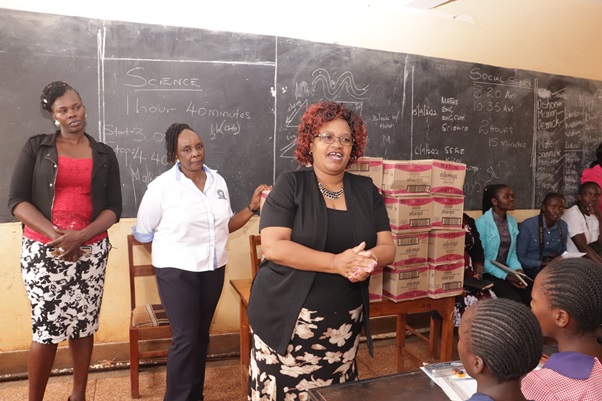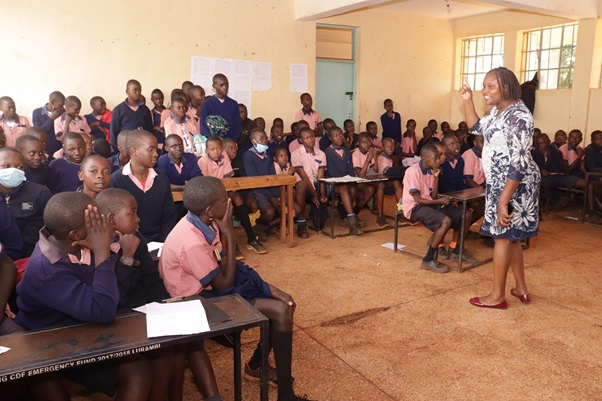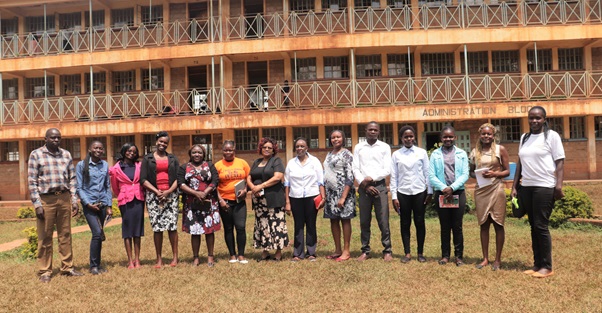MMUST’s African women in Science and Engineering (AWSE) have stepped up efforts to keep girls in school through provision of free sanitary towels. On 7th September, 2022, the team of scholars led by Prof. Elizabeth Omukunda, Dr. Rose Opiyo and Dr. Frida Njeru visited Amalemba and Kakamega primary schools with the aim of encouraging the girls and donating the sanitary towels. This outreach activity is part of the AWSE initiative to support the girl child in Kakamega County.
The head teacher, Amalemba Primary School, Miss Grace Baraza thanked the team and the University for remembering her girls and for contributing towards keeping them in school. She revealed that the school has had previous incidences of learners being lured into early sexual activities for material things due to high poverty levels in the region.
“I thank MMUST for identifying our school for this programme. We are happy that you are here to support our course of keeping our girls in School. Thank you for your generosity. We ask that you continue supporting our goal of ensuring menstrual hygiene, retention of girls in school and mental health,” she said.

Miss Grace Baraza addressing the learners during the event.
Speaking to the learners about menstrual hygiene, Dr. Rose Opiyo, a developmental psychologist stressed that poor menstrual hygiene can result in fungal and bacterial infections across the reproductive and urinary tract. She urged the young learners to observe good hygiene practices to be safe from serious conditions such as cervical cancer. Dr. Opiyo further advised the learners to abstain from premarital sexual behaviours and concentrate on studies.
Dr. Frida Njeru, a lecturer at MMUST asked the learners to pray and work hard. Quoting the famous line in the bible, ‘Faith without action is dead’, she emphasized on ‘action’ reminding the learners that they must read in order to succeed.
“Have motivation that will drive you whenever you read. Motivation will remind you why you are working hard to achieve your goals. Set targets, respect them and remember not to let those who have made it scare you from pursuing your dreams,” she added.
Dr. Frida further assured the students that the University fraternity is excited to welcome them to the University and that they all have a fair chance as long as they excel.
The Director Corporate Communication and Marketing, Dr. Lydia Anyonje also had the opportunity to engage the girls. She assured the girls of a chance to join the University as long they pass their exams. Dr. Anyonje welcomed the learners to visit the University at any time to have a gist of what their futures will feel like there. The girls were excited and showed their appreciation through hearty claps and smiles.
Speaking to the boys, the team of scholars, alongside student volunteers from the University encouraged them to be part of the menstrual hygiene discussions. They stressed on this, saying that it will help in addressing the stigma that comes with periods.

Ms. Alice Mbuthia speaking to the boys during the event.
The economic crisis that arose due to COVID-19 has continued to create challenges for girls in the slum of Kakamega County as well as Kenya as a whole. Priority has shifted to food and shelter as the girls’ menstrual health is relegated to the background.
Other key persons present during the event was the Deputy head teacher Amalemba primary school, Mr. Mosomi Sani, Teacher in charge of health Amalemba primary, Ms. Nancy Kuboka and Ms. Alice Mbuthia from MMUST ODeL. Accompanying them were students who included Ms. Penina Kimasere, Ms. Linda Tsindoli, Mr. Isaac Wafula and Irene Shivachi.

The team of scholars from MMUST, student volunteers and representatives from Amalemba Primary School after the event.
According to UNESCO estimates, around the world 129 million girls are out of school, including 32 million of primary school age. In Kenya, 850,000 girls miss school 5-6 days every month during their menstruation. Further, research indicates that while enrolment rates have reached gender parity, in primary schools, completion rates for girls are lower in low-income countries. It is clear that girls continue to lag because of lack of sanitary towels.
Notably, poverty is one of the most important factors for determining whether a girl can access and complete her education. On the other hand, menstruation is a topic that many people are usually uncomfortable talking about. We should strive to get the information out there, for lack of knowledge fuels fear, shame, myths which humiliate women and girls and most of all keeping them from school.
By Caren Nekesa and Brenda Lusaa
Photos by Gabriel Juma




